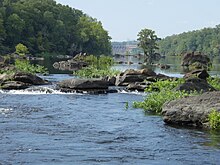Clappia umbilicata
| Umbilicate pebblesnail | |
|---|---|

| |
| Drawing of apertural view of the shell and operculum of Clappia umbilicata | |

| |
| Drawing of apertural view of the shell of Clappia umbilicata from its type description by Bryant Walker | |
| Scientific classification | |
| Domain: | Eukaryota |
| Kingdom: | Animalia |
| Phylum: | Mollusca |
| Class: | Gastropoda |
| Order: | Neotaenioglossa |
| Family: | Lithoglyphidae |
| Genus: | Clappia |
| Species: | †C. umbilicata
|
| Binomial name | |
| †Clappia umbilicata | |
| Synonyms[1][5] | |
| |
Clappia umbilicata, the umbilicate pebblesnail, was a species of small freshwater snail that had an operculum, an aquatic gastropod mollusk in the family Lithoglyphidae.[6] This species is now extinct.[1][2]
Distribution
[edit]This species was endemic to the State of Alabama in the United States.[1] The type locality is the Coosa River at Wetumpka, Alabama.[3]
The distribution of this species used to include: Coosa River at Duncan's Ripple, The Bar and Higgin's Ferry in Chilton County; and Butting Ram Shoals in Coosa County, Alabama.[4][7]
-
Chilton County, Alabama (marked red) where the species was found
-
Coosa County, Alabama (marked red) where the species was also found
Description
[edit]This species was discovered and described under the name Somatogyrus umbilicatus by the American malacologist Bryant Walker in 1904.[3] Walker's type description reads as follows:

Somatogyrus umbilicatus n. sp. Pl. v, fig. 5.
Shell small, globosely depressed, umbilicate, light greenish-yellow, smooth, except for the fine, rather unequal, lines of growth. Spire short, obtusely elevated. Whorls 3½ those of the spire convex and separated by a well-impressed suture; body whorl large, gibbously convex. Aperture sub-circular, rather longer than broad, obtusely angled above and slightly flattened along the basal margin. Columella concave, narrowly reflected; columellar callus, moderately heavy, rounded, reflected over but not concealing the round, deep umbilicus, thin and transparent on the parietal wall. Alt. 3, diam. 3 mm.
Coosa river at Wetumpka, Ala. (type locality), also at Fort Williams Shoals above Farmer, Ala.
This species is remarkable for its depressed, valvata-like form and round, deep umbilicus, which readily differentiates it from all other known species of the genus. It does not appear to be very abundant at Wetumpka, and only a single example was collected at Fort Williams Shoals.
The color of Clappia umbilicata was black.[4] This presumably means that the whole animal including snout, nape, mantle and foot were black.[6] The black color of the mantle was verified by Thompson (1984).[6]
Clappia umbilicata has 56-59 rows of teeth on its radula.[6] Each row has 6-7 central basocones, 6-7 central ectocones, 18-21 lateral teeth, ca. 50 inner marginal teeth and ca. 35 outer marginal teeth.[6]
Ecology
[edit]
The natural habitat of this species was rivers.[1] Clappia umbilicata inhabited only the rapidly flowing sections of river shoals.[6] The snail died out because of silting of its habitat after the dam was constructed in 1928.[1] (Also see Jordan Dam and Jordan Lake).
Based on examination of the radula, Thompson (1984)[6] hypothesized that Clappia umbilicata grazed on fine particles of plants, specializing on finer-sized particles than those consumed by snails in the genus Somatogyrus.[6]
References
[edit]This article incorporates public domain text from reference[3][7]
- ^ a b c d e f Mollusc Specialist Group (2000). "Clappia umbilicata". IUCN Red List of Threatened Species. 2000: e.T40046A10310990. doi:10.2305/IUCN.UK.2000.RLTS.T40046A10310990.en. Retrieved 15 November 2021.
- ^ a b "Clappia umbilicata". NatureServe Explorer An online encyclopedia of life. 7.1. NatureServe. Retrieved 4 June 2023.
- ^ a b c d Walker B. (1904). "New species of Somatogyrus". The Nautilus 17(12): 133-142. page 137. plate 5, figure 5.
- ^ a b c Walker B. (1909). "New Amnicolidae from Alabama". The Nautilus 22(9): 85-90. page 89.
- ^ Kabat A. R. & Hershler R. (1993). "The prosobranch snail family Hydrobiidae (Gastropoda: Rissooidea): review of classification and supraspecific taxa". Smithsonian Contributions to Zoology 547: 1-94. page 18. PDF.
- ^ a b c d e f g h Thompson F. G. (1984). "North American freshwater snail genera of the hydrobiid subfamily Lithoglyphinae". Malacologia 25(1): 109-141.
- ^ a b Clench W. J. (1965). "A new species of Clappia from Alabama". The Nautilus 79(1): 33-34. Figure 2.




